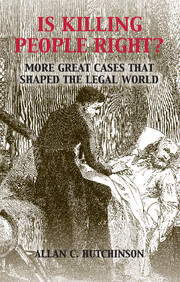Book contents
- Frontmatter
- Dedication
- Contents
- List of figures
- Preface
- 1 Introduction: on the road (again)
- 2 Is killing people right?: law and the end of life
- 3 Oil on troubled waters: the consequences of civil liability
- 4 The politics of law: cats, pigeons and old chestnuts
- 5 The companies we keep: the moralities of business
- 6 Fifty shades of Brown: consent and the criminal law
- 7 Putting up a defence: sex, murder and videotapes
- 8 Wade-ing into controversy: a case of accidental activism
- 9 Playing a different tune: fairness in deal making
- 10 Conclusion: surfing the tides
- Sources
- Index
- References
3 - Oil on troubled waters: the consequences of civil liability
Published online by Cambridge University Press: 05 May 2016
- Frontmatter
- Dedication
- Contents
- List of figures
- Preface
- 1 Introduction: on the road (again)
- 2 Is killing people right?: law and the end of life
- 3 Oil on troubled waters: the consequences of civil liability
- 4 The politics of law: cats, pigeons and old chestnuts
- 5 The companies we keep: the moralities of business
- 6 Fifty shades of Brown: consent and the criminal law
- 7 Putting up a defence: sex, murder and videotapes
- 8 Wade-ing into controversy: a case of accidental activism
- 9 Playing a different tune: fairness in deal making
- 10 Conclusion: surfing the tides
- Sources
- Index
- References
Summary
Everyone makes mistakes or acts carelessly. Most of the time, the error is harmless and life goes on much as normal. But, at other times, a small slip can result in large and harmful consequences; injuries can be widespread and damage can be catastrophic. While the common law has long had a set of rules that holds careless individuals responsible for their negligent acts, it continues to wrestle with the thorny question of whether they should be liable for all or only some of the damage that they cause. For example, someone might inadvertently drop a still-lit cigarette stub in a waste bin that results in a fire that burns down a whole district and kills many people. In legal doctrine, this is known as ‘the remoteness of damage’ problem.
For many, this distinction between the nature of the act done and the extent of damage caused by it may appear contrived and almost beside the point. It might be claimed that people should have a moral obligation to assume the full costs and consequences of their blameworthy actions, even if the extent of damage was unexpected; the law should effect and mirror such a stance. However, for the last fifty years or so, the common law has taken seriously the argument that there should be some proportionality between the nature of the careless act and the extent of liability for its consequences; small acts of negligence should give rise to smaller liability than larger ones. As with much else, ‘reasonableness’ is the watchword of the common law of tort.
The leading cases on remoteness of damage, each flowing from the same shipping incident in Sydney Harbour, occurred in the mid-twentieth century. Like so many of the common law's great cases, the surrounding circumstances and characters involved as well as the social attitudes displayed were very much in line with the times. However, since then, values and sensitivities have changed. Even though the guiding principles of law remain the same today, it is not too difficult to appreciate that a similar set of facts might well produce a different outcome today. And perhaps that is as it should be – the common law shifts and switches with the prevailing social milieu; it moves, not in lock step, but along much the same path, often lagging behind, but occasionally pulling ahead.
- Type
- Chapter
- Information
- Is Killing People Right?More Great Cases that Shaped the Legal World, pp. 27 - 41Publisher: Cambridge University PressPrint publication year: 2016



